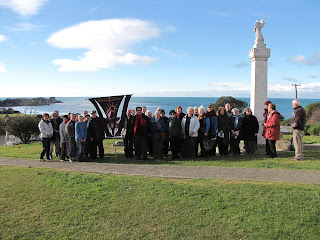On Saturday it was cold (again) but that didn't stop 32 of us making the next leg of our diocesan pilgrimage. This time it was a shortish trip from Dunedin up the coast to the places where it all started for us. We went to Waikouaiti where, in 1858, Johnny Jones - whaler, entrepreneur and benefactor of just about every Christian denomination he could think of - built the oldest extant church in our diocese. St. Johns is an extraordinarily peaceful and beautiful old building, set in it's churchyard by the lagoon shaded by its elderly trees. It is one of our great treasures, as are the other places we visited on this compact Otago Coastline.
From Waikouaiti it was a ten minute backtrack to Karitane where we were welcomed onto the Puketeraki Marae, before walking up the hill to Hui te Rangiora church. The little wooden chapel is perhaps not as picturesque as St. John's but the view from the church porch is stunning. Below the church is the marae with its ingenious, modern interpretations of traditional Maori carving. Beyond is the Karitane peninsula with its history of bloodshed and shelter and redemption. It was on this coastline that the Gospel was first preached in our part of the world: not by Pakeha missionaries but by Maori ones. The first European clergy arrived here to find an already well established church.It was here, a little later that Hoani Parata, first Maori priest in our diocese was born.
Professor John Broughton generously hosted us to lunch in the little colonial bungalow he has filled with paintings and interesting objects. Then as a piercing southerly competed for supremacy with a fiercely bright blue winter sky, some of us made the circumnavigation of the peninsula while others dozed in the company of Prof. Broughton's cheery artworks and books and fireplace.
We ended the day at St. Barnabas' Warrington. This third small wooden church of the afternoon is remarkable for a number of things. Its large wooded grounds for one thing. The grave of the first Bishop of Dunedin, Samuel Tarratt Nevill for another. But perhaps most remarkable is the stained glass. In the first world war a window destined for an obviously large Brisbane church was refused handling by the patriotic Aussie watersiders because it was made in Germany. Unloaded in Dunedin instead, it found its way into St. Barnabas Church where it was fitted into a space several sizes too small for it. The result is breathtaking. In the dark little church the window takes up, almost entirely, the West wall. It is a simply lovely place and I'm glad some more of our people were privileged to see it.
Then we boarded the little bus for the journey home. I travelled the short distance back to the All Saints car park thinking about the righteously finicky watersiders and the happy results of their indignation; about Tamihana Te Rauparaha following his father down the coast, bring forgiveness and reconciliation in place of treachery and bloodshed; about Johnny Jones slaughtering the whales and using the proceeds to shape the communities of Otago and to bring blessing for generations after him. It was a truly lovely day. It was all about redemption.





Comments